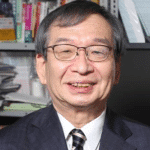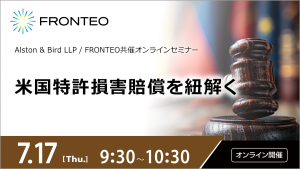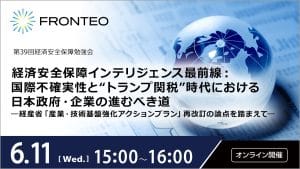[Online Seminar held on June 6th] Should Data Be Stored Within the Country?: Cross-border Application of Discovery and Government Access
[Online seminar co-hosted by Azabudai Kataoka Law and Economics Office and FRONTEO Co., Ltd.]
Against the backdrop of recent geopolitical changes, the trend toward data protectionism is growing in each country, and the concept of "free flow of data" is losing its function as a fundamental principle of international cooperation.
In the past, the United States strongly advocated for the freedom of cross-border data transfer and led the way in realizing a free and open digital economy. In recent years, however, in addition to strengthening sanctions against China for national security reasons,Announcement of strengthening controls over foreign users of U.S. cloud services, and is moving down the path of unilateral data protectionism. Meanwhile, China, which also places importance on national control, is strictly restricting cross-border data transfers in the name of digital sovereignty and institutionalizing localization measures. Amid these trends, there are countries that promote the acquisition of data overseas while restricting the outflow of data within their own countries, which is expanding the asymmetry of data distribution in AI learning and other areas, and is becoming a source of international friction. In the future, it is expected that Japanese companies will be forced to provide trade secrets due to the cross-border application of US discovery and requests for government access from other countries. As a countermeasure, I would like to discuss with all the participants from the perspective of "Should data be stored domestically?"
Date: 2025th 6th July , (Monday) 30:15-00:16

Hiroshi Kataoka Attorney
Azabudai Kataoka Law and Economics Office)
PhD Candidate in Informatics (Institute of Information Security)
After retiring as chief prosecutor, currently working as a lawyer and certified fraud examiner.
Articles in the same category

[Online Seminar held on July 7] Fundamentals and Practice of US Litigation: Strategic Management for Japanese Companies with a Focus on Discovery Responses

[Online Seminar held on July 7th] Unraveling the mysteries of US patent damages

[July 7th - Seminar co-hosted by Re-grit Partners Inc. and FRONTEO Inc.] To respond to continuing problems and scandals - Shifting to a forward-looking approach that also considers potential risks -

[Online Seminar held on July 7] New threats in the digital transformation era and their risk management

[Online Seminar Held June 6th] How to Deal with, Utilize, and Apply the Security Clearance System in Companies

[Online Seminar held on June 6th] "Drug Discovery AI Factory" - an AI drug discovery support service that discovers the unknown from the known

[Online seminar held on June 6th] "Awareness-based legal affairs" protect companies ~ Investigation x Reporting Promotion and Control ~ Practical knowledge of "early response to potential problems" that practitioners should know now

[6/11 39th Economic Security Seminar] The Frontline of Economic Security Intelligence: The Path Forward for the Japanese Government and Companies in an Era of International Uncertainty and Trump Tariffs - Based on the Issues of the Revision of METI's "Action Plan for Strengthening the Industrial and Technological Base" -

[Online Seminar held on June 6th] Amendments to the Whistleblower Protection Act of 12 and points to note




